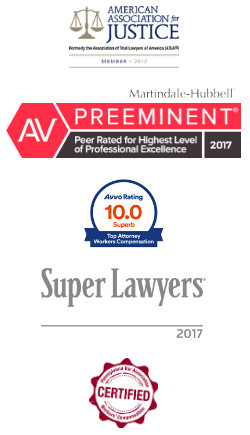Considering how life-altering workplace injuries can be, both physically and financially, securing fair compensation through a workers’ compensation claim can be a critical step toward financial stability.
However, while settling a work comp claim can provide you with the support you need to recover and move forward with your life, this process is not without its hidden dangers that, more often than not, go unmentioned.
Fortunately, it is possible to avoid these common pitfalls, especially if you have a good Allentown workers’ compensation attorney, who will expand on the information we provided here, thereby giving you all the tools necessary to successfully realize your claim.
Understand the Compromise and Release Agreement
In Pennsylvania, workers’ compensation cases are settled by entering into a compromise and release agreement. The parties then must go to a hearing in which the workers’ compensation judge determines whether the injured worker understands the significance of the agreement.

In Hong v. WCAB, 51 A.3d 905 (Pa. Cmwlth. 2012), the injured worker entered into a lump sum settlement. The agreement did not say whether unpaid medical bills would be paid in addition to the lump sum. After the settlement, the injured worker learned that one physician had an outstanding bill in excess of $37,000.00 which the employer refused to pay.
The Commonwealth Court stated that to set aside a compromise and release agreement, the party trying to set it aside must show fraud, deception, duress, or mutual mistake. The court found that none of these factors was present.
The court found that had the claimant wanted to ensure payment of past medical bills in addition to the lump sum, his counsel could have included appropriate language in the agreement. That the claimant had counsel was an important factor for the court.
Bottom line: Make sure you understand the Compromise and Release Agreement, including any provisions concerning the payment of medical expenses.
Protecting your right to medical coverage
If you are keeping the medical expenses open when you settle your case, look closely at the language. Sometimes injured workers will settle a workers’ compensation case while keeping the insurance companies’ responsibility to medical bills open.
In DePue v. WCAB, 61 A.3d 1062 (Pa. Cmwlth. 2012), the injured worker entered into a compromise and release agreement which described the injury as “closed head injury with seizure disorder and short-term memory loss.”
After the compromise and release agreement was approved, the injured worker filed a penalty petition alleging that the employer failed to pay for medical bills for a shoulder injury and then filed a review petition to add a left shoulder injury to the description of injury.
The Commonwealth Court ruled that the injured worker cannot do so. In connection with the resolution of the case, the injured worker is bound by the description of injury contained in the compromise and release agreement.
The parties can, by agreement, say that the agreement is without prejudice to the right of the claimant to add additional injuries at some future point. Absent that language, the injured worker is going to be bound by the description of injury contained in the compromise and release agreement.
Bottom line: If you are keeping medical expenses open in the settlement of your workers’ compensation case, pay careful attention to the description of the injury contained in the agreement, to avoid falling into this common insurance company’s trap.
What was the biggest workers’ comp settlement in Pennsylvania?
This is one of the most common questions work comp lawyers hear anywhere from Lehigh Valley to Pitsburg, expecting to hear about astronomical sums. The truth, however, is – it doesn’t really matter.
There are limits on the benefits an injured person may receive under the Pennsylvania Workers’ Compensation Act. For the profoundly injured or disabled worker who may need expensive medical care, it may make no sense to settle a workers’ compensation case. Merely because an attorney settled a workers’ compensation case for a large sum of money may mean nothing if the client gives up medical coverage. If the settlement is used to pay for medical treatment and the money runs out, the client may have nothing but Medicare to pay for additional medical treatment, and Medicare has very significant coverage limitations.
Workers’ compensation is not like a personal injury law, in which an individual can recover for loss of future earning power, pain and suffering, and economic damages. Most workers’ compensation recoveries in Pennsylvania are limited primarily to medical expense coverage. When the parties settle a workers’ compensation case, it is a true settlement in which all parties agree to the settlement amount. In a personal injury case, an attorney can always let a jury decide the value of the case. That cannot be done in workers’ compensation court.

If a firm brags about a multi-million-dollar workers’ compensation settlement, they represented somebody who suffered a catastrophic injury and settled the case for a lump sum the insurance company was willing to pay because it thought it would be cheaper than paying for future medical expenses.
If the insurance company thinks it is cheaper to pay millions in a lump-sum settlement of medical expenses, do you think the worker may have been better off with open life-long medical coverage? Don’t be fooled by people bragging about settling such cases. We routinely reject requests to settle their claims for medical benefits because it sometimes is not in the interests of the profoundly sick or injured to give up medical coverage.
Where in Allentown can I find a dedicated workers’ compensation attorney?
At Liberty Bell, we have extensive experience helping individuals navigate the convoluted alleyways of Pennsylvania’s work comp system. Our team of highly knowledgeable lawyers from Allentown knows the ins and outs of the process and can help you avoid common dangers and pitfalls with the utmost confidence. Reach out to us today for a free consultation and ensure you have a team who will fervently advocate for your rights!








